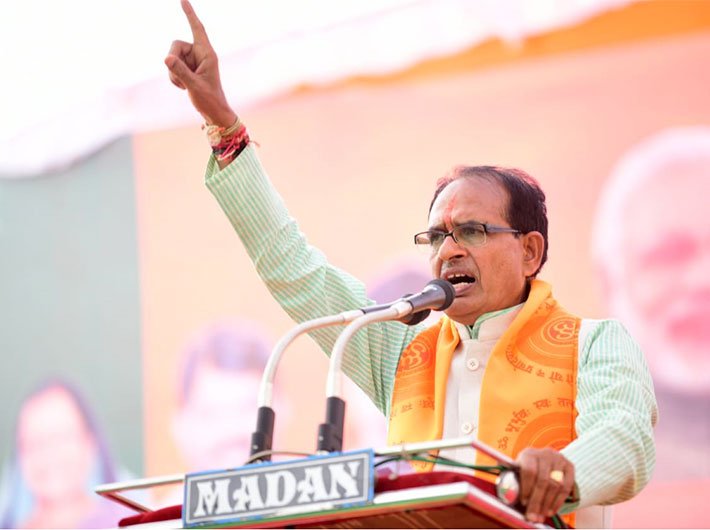Is Shivraj Chouhan’s goose cooked? After BJP’s 15-year rule change seems to be in air
Sharp, funny, vicious and raucous as the political discourse is on social media, it is no match for rural India's pithy street wisdom. A few kilometres away from the Datia constituency in a rural setting, a villager gives me a taste of this when I enquire about which way the Madhya Pradesh Vidhan Sabha election is headed. “Roti dono taraf se senkna chahiye. Ek taraf jyada senkne se jal jaati hai (you need to bake the bread from both sides; overdoing one side will burn it).”
He did not take any names, neither of individuals nor of parties. But nothing could have described better the delicious dilemma of three-term chief minister Shivraj Chouhan as he seeks a record fourth term in the election slated for November 28. Chouhan has been popular enough to get 13 years on the trot, but that very achievement is his biggest hurdle now. Another five years for him would mean the bread will be overdone on one side. So it is now time to bake the bread on the other side.
It is not prudent to predict people’s political behaviour based on one villager’s profundity given the complexity of economic, religious, political and social issues involved in a Vidhan Sabha election. But the sense one gets from an attempt to gauge people's pulse after visiting various places and meeting a cross-section of people is that the feeling is predominant in the entire Gwalior region flanked by the Chambal ravines and Bundelkhand.
Take for example the reaction at Pitambara Peeth, a powerful tantrik temporal seat at Datia, represented by powerful BJP minister Narottam Mishra. Sitting in the verandah on a languorous afternoon, priests were engaged in their favourite pastime — political gossip and speculating about the election results. And they seemed to be convinced that Chouhan was on a sticky wicket. Although my intervention in their discussion alerted them, they overcame their inhibition and stuck to their position that the BJP was heavily weighed down by the anti-incumbency factor.
Away from Datia to another extreme of Gwalior are the Chambal ravines in Morena where the dreaded brigands known as baaghis (rebels) used to roam not long ago. Till four decades ago these ravines were inaccessible for most people, as their terrains were infested by dreaded dacoits led by the redoubtable Madho Singh, Mohar Singh, Tehsildar Singh, Makhan Singh and Paan Singh Tomar. A biopic on the latter featuring Irrfan Khan caught the attention of people recently and portrayed the tough life in the Chambal ravines.
Interestingly, these ravines coexist with pristine historical sites that are treasure troves for excavation and the restoration of certain extraordinary monuments. Nearly 50 kilometres away from Gwalior, three such villages in a row – Bateshwara, Parawali and Mitawali – are home to monuments from 300 to 600 AD. Bateshwara has a big Shiva temple with nearly 300 miniature temples around it. The excavation of the site was undertaken by an enthusiastic and renowned archaeologist, KK Muhammad, who singlehandedly restored a part of the structure from ruins. On the face of it, the site looks like a replica of Angkor Wat of Cambodia. In Mitawali, a Shiva temple on a hilltop looks like an exact replica of the Indian Parliament.
I have deliberately introduced the archaeological significance of Morena in order to bring out a larger issue which affects the society and politics of the region. While I was watching the beauty of these magnificent ruins, a big booming sound unnerved me. “What is this?” I asked an Archaeological Survey of India (ASI) employee who was standing nearby. “This blast is due to quarry mining in the nearby hills and this is patently illegal,” he said, adding that although the ASI had written to the state government about the adverse impact of mining on the archaeological sites, the mining continues quite brazenly.
It is an open secret in the entire region that the quarry-mining mafia and sand-mining syndicate operate in the region with impunity thanks to the help of local BJP leaders that include even ministers. The fact that the sand mafia even killed a trainee IPS officer near Gwalior did not prove to be provocation enough for the state administration to check this criminal enterprise.
The reason is obvious. The economy involved in both these underground activities run into hundreds of crores under the protective umbrella of politics. Since the BJP has been ruling the state for the past 15 years, the party's state leadership is the biggest beneficiary of this mafia operation. Of course, in Gwalior region, this rampant mining of quarry and sand has adversely affected people’s lives. “It is often difficult to sleep due to the noise of blasts,” said a resident of Bateshwara. And yet, the fact that mining has been happening in the midst of the election season speaks volumes about the brazenness of the crime syndicate operating in the region.
Apparently the reign of terror unleashed by mine-mafias in the Chambal ravines and the hilly tracts is far more dangerous than that of the gangs of dacoits in the past. At the social and ecological level, these mafias in collaboration with politicians and bureaucrats have ruined the life of ordinary people. The fact that the Madhya Pradesh government appears to be acting as a wilful accomplice in this crime is going against the BJP in this Vidhan Sabha election. What appears to be compounding the BJP's woes is the reality that Gwalior was considered the epicentre of Vyapam scandal in which a fake recruitment drive across the state thrived.
By all reckoning, the accumulated indiscretions of the BJP regime over three terms bear out the earthy formulation of the peasant who says, “Roti ek taraf se jyada senk gayee hai (the bread is overdone on one side).”
[This comment has appeared on FirstPost.com]

